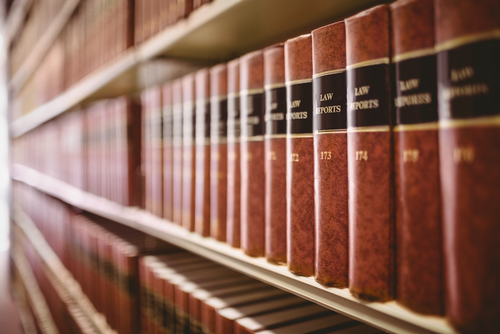'Magic spell hypothesis' may explain legalese, researchers say

Researchers studying the origins of legalese say lawmakers and lawyers may write laws and legal documents in a convoluted manner to confer a “ritualistic, spell-like element” signaling authority. (Image from Shutterstock)
Researchers studying the origins of legalese say lawmakers and lawyers may write laws and legal documents in a convoluted manner to confer a “ritualistic, spell-like element” signaling authority.
The researchers dubbed their conclusion the “magic spell hypothesis,” according to their article published Monday in the Proceedings of the National Academy of Sciences, which is available here.
Courthouse News Service and ScienceDaily covered the findings.
A past study by the researchers noted that legal documents often have “center-embedded syntax” in which clauses are inserted in the center of sentences. The sentence structure makes the text more difficult to understand, even for lawyers.
Researchers wanted to know why, so they designed two experiments to test the magic spell hypothesis and a second “copy-and-edit” hypothesis. The latter posits that writers insert clauses in the middle of sentences when adding information to an initial draft.
In their new study, the researchers asked nonlawyer volunteers to write laws and other kinds of texts. When writing laws, the volunteers used convoluted language and center-embedded text. For other writing tasks, the volunteers used a simpler sentence structure.
“In English culture, if you want to write something that’s a magic spell, people know that the way to do that is you put a lot of old-fashioned rhymes in there,” said senior study author Edward Gibson in an interview with ScienceDaily. “We think maybe center-embedding is signaling legalese in the same way.”
Gibson is a professor of brain and cognitive sciences at the Massachusetts Institute of Technology. Other study authors are Eric Martínez, a fellow and instructor at the University of Chicago Law School, and Francis Mollica, a lecturer in computational cognitive science at the University of Melbourne in Australia.
In the first experiment, 200 nonlawyer volunteers were asked either to write a law prohibiting a crime or a story describing someone committing that crime. Half of those in each group were given all the details, and the other half were provided with a pared-down description. The pared-down group was then given additional details to add to their text.
There were “striking” differences based on the writing assignment. About 48% of the sentences in laws written by participants had center-embedding, compared to 5.8% of the sentences in the stories.
In a blow to the editing hypothesis, there was little difference in text written with all the details the first time and text in which details were added later.
In the second experiment, 80 nonlawyer participants were told to either write a law banning a crime or to act as a “tour guide” for foreigners by writing a description of it. The results were similar: Participants were more likely to include center-embedding when they wrote laws.
Next up? The researchers plan to analyze British laws that were the basis for American laws to see whether they also included center-embedding. They also plan to analyze the Hammurabi Code.
The researchers are 2022 winners of the satiric “Ig Nobel Prize” for their research on what makes legal documents difficult to understand. That research found that legalese is characterized by unnecessary jargon, passive sentence structure and nonstandard capitalization. But the characteristic that makes legal documents most difficult to read was the center-embedded clause.
According to a September 2022 press release from the Massachusetts Institute of Technology, a science humor magazine called the Annals of Improbable Research gives out the award. It celebrates “achievements that first make people laugh and then make them think.” The prize is a 10 trillion Zimbabwean dollar bill and a paper trophy.



